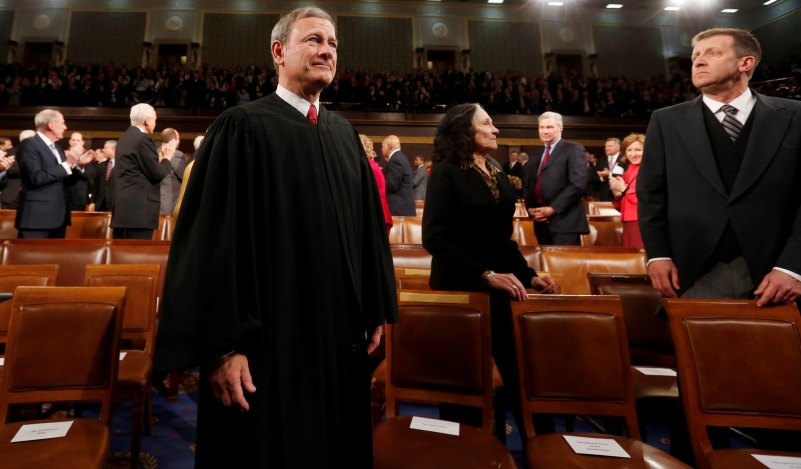
Scholar argues that recent Supreme Court decisions create a new vision of agency accountability to the public.
Can federal agencies tell the public one thing and the courts another? The answer is that this inconsistency is usually tolerated—but that may be changing.
Agencies must answer to the requirements in the Administrative Procedure Act (APA). Courts enforce the APA to ensure that agencies explain their actions. Nothing explicit in the APA demands consistency between the justifications given to the public and the courts.
But in a recent article, Professor Benjamin Eidelson of Harvard Law School argues that two recent Supreme Court cases create an implicit requirement of consistent reasoning. He contends that the author of both decisions, Chief Justice John Roberts, interprets the APA to impose this implicit rule because it ensures that agencies are accountable to the public by exposing the government’s true motivations.
In Department of Commerce v. New York, the Supreme Court rejected the U.S. Department of Commerce’s attempt to ask census respondents their citizenship. The head of the department, Wilbur Ross, justified the decision by saying the citizenship information would enable the Commerce Department to better enforce the Voting Rights Act (VRA).
That focus on enforcement of the VRA turned out to be a “distraction” rather than an “explanation” because it was “contrived,” concluded the Court. In reality, Secretary Ross and the Trump Administration harbored other motives.
The Court’s rejection of the Commerce Department’s action focused on its use of “pretextual” reasons—reasons that are not genuine. “The reasoned explanation requirement of administrative law … is meant to ensure that agencies offer genuine explanations for important decisions, reasons that can be scrutinized by courts and the interested public,” wrote Chief Justice Roberts in his majority decision.
Eidelson contends that consideration of the “interested public” in the Court’s logic is a “significant development.” He reasons that pretextual reasons are wrong because the public cannot evaluate them, thereby preventing the public from holding an agency accountable.
Transparent motivations matter to accountability, Eidelson explains, as people rely on reasons to judge decisions. He offers an example of someone who declines to visit a relative in a nursing home, noting that if the reason is to protect the relative from a deadly virus, we might approve of the decision, but if the reason is laziness, we would disapprove.
For governmental actions, public approval or disapproval translates to political accountability, which could involve vocal public criticism, congressional oversight, or voters taking action in elections to vote out the President who leads the executive agencies.
Eidelson argues that concerns of the Court about political accountability—and of Chief Justice Roberts in particular—also drive the reasoning of the Court’s decision in DHS v. Regents of the University of California, in which the Court prevented the Department of Homeland Security (DHS) from ending Consideration of Deferred Action for Childhood Arrivals (DACA), a program that protects children of undocumented immigrants from removal.
When DHS explained its decision to end DACA to the public, the agency claimed the decision was compelled by law. When DHS’s legal conclusion was questioned in court, DHS offered additional policy reasons to end the program. But the Supreme Court ultimately rejected these policy reasons as “post hoc rationalizations”—reasons offered after the decision had been made.
Chief Justice Roberts explained that “requiring a new decision before considering new reasons promotes ‘agency accountability’ by ensuring that parties and the public can respond fully and in a timely manner to an agency’s exercise of authority.”
Eidelson asserts that the concern for political accountability also underlies the Court’s rejection of the agency’s “buck-passing” claim of legal compulsion, in which the government refused to claim responsibility for the decision by blaming the law for tying its hands. The Court held that DHS had not considered its option to retain pieces of the DACA program, even if some portion of the program was illegal. Eidelson reasons that the value of political accountability makes buck-passing wrong because the government can hide its motivations by saying it had no choice.
Eidelson argues that the value of political accountability underlying the Supreme Court’s rejections of pretextual, post hoc, and buck-passing reasoning will affect future courts’ review of agency decisions.
He calls into the question the practice of “remand without vacatur,” which involves courts giving agencies a second chance to explain an action after finding the first justification defective. Courts sometimes allow an agency decision to remain in effect even if its logic is faulty, on the assumption that the agency would reach the same conclusion and pursue the same action once given the opportunity to submit further explanation.
Eidelson contends that if courts are concerned about public accountability, however, then agencies must get the justification right the first time—when they announce the decision to the public—rather than relying on the courts to uphold the policy while the agency tries to remedy its logic.
In addition, Eidelson expresses concern about the practice of agencies presenting arguments in the alternative. Agencies often provide several, independent reasons for decisions. But a court concerned about political accountability should care about what reason was offered to the public, Eidelson reasons, irrespective of whether other reasons might suffice as logical.
Eidelson also addresses arguments against emphasizing political accountability in the judicial review of agency decision-making.
In response to concerns that courts would use political accountability to impose improper procedures on agencies, Eidelson points to the APA’s language that “due account shall be taken of prejudicial error.” He argues that this should be interpreted to refer to the type of prejudice that arises when agencies act without incurring the relevant political cost. Furthermore, Eidelson states that it does not matter that the public rarely knows the reasons for agency decisions. Eidelson says that reasons still matter, particularly for major decisions, as they impact Americans’ views as to whether the President “shares my values” or “cares about people like me”—which have broad political implications.
Of course, some may read Chief Justice Robert’s opinions as simply protecting the Supreme Court’s reputation for neutrality in politically-charged cases. To this skepticism, Eidelson responds that regardless of Chief Justice Robert’s motivations, the two cases now have a “significant foothold in the law.” An emphasis on the value of political accountability provides a natural and necessary development in administrative law, he concludes.



